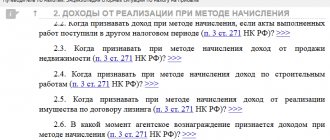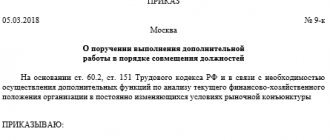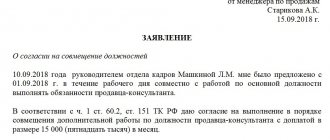What is part-time work? Key points
Part-time work is the performance by an employee of regular paid work under the terms of an employment contract in his free time from his main job (Article 282 of the Labor Code of the Russian Federation).
Key points when working part-time:
- The duration of the working day should not be more than 4 hours. Exceptions are possible in two cases: on a day when the employee is free from his main job and when his main job has a day off.
- labor must be paid in proportion to the time worked (Article 285 of the Labor Code of the Russian Federation)
External and internal part-time work: similar characteristics
The two types of part-time jobs have similar features:
- in any option, a separate employment contract is concluded, which necessarily states that the work will be performed on a part-time basis (Article 282 of the Labor Code);
- the work of part-time workers is paid in accordance with Article 285 of the Labor Code - in proportion to the working time they worked, or for the amount of work actually completed with time-based payment and the establishment of standardized tasks;
- it is necessary to comply with the duration of working hours, which is established by Article 284 of the Labor Code - in particular, it should not last more than 4 hours a day (exceptions are days when a part-time worker does not perform work duties for the main employer), and cannot exceed ½ of the established monthly working hours;
- the number of employment contracts concluded by external and internal part-time workers is not limited by law (Article 282 of the Labor Code);
- restrictions regarding part-time employment of certain categories of citizens apply regardless of whether it is external or internal.
Let us remind you that, according to Article 282 of the Labor Code, it is not allowed to accept part-time minor workers, as well as applicants for vacancies with harmful/dangerous working conditions, if the conditions at the main job are the same. In addition, restrictions have been established in relation to company managers and representatives of certain professions: lawyers, judges, security officials, deputies, athletes, coaches, drivers, etc.
Combination
Combination is the assignment of additional responsibilities to an employee, along with the work specified in the employment contract. This work must be paid and performed within a specified working day.
Various combination options are possible. For example, a leading accountant was assigned to manage the organizations assigned to his colleague during his vacation. This is an expansion of the service area or an increase in the volume of work. Another type of combination is the combination of professions and positions. For example, a warehouse manager performs the duties of a loader.
Here are the basic rules that should work when combined:
- all professions and positions for which combination is provided must be indicated in the staffing table.
- the employee's written consent must be obtained for combination.
- the employer and employee may refuse to combine. The other party must be notified of this decision three working days in advance.
Part-time and combination can be used simultaneously. An employee can receive a salary for a part-time job and at the same time receive an additional payment for a part-time job. There is no prohibition on this in the legislation.
Who is prohibited from working part-time?
You cannot work part-time:
- persons under 18 years of age (Article 282 of the Labor Code of the Russian Federation);
- persons who are employed in work with dangerous or harmful working conditions or in work related to transport or traffic control, if their main work takes place in the same conditions (Article 329 of the Labor Code of the Russian Federation);
- municipal and government employees (Article 17 of the Federal Law of July 27, 2004 No. 79-FZ, Article 14 of the Federal Law of March 2, 2007 No. 25-FZ);
- persons working in government agencies, armed forces, police, courts, prosecutors, etc.;
- heads of state and municipal educational organizations, as well as their branches (Article 51 of Federal Law No. 273-FZ of December 29, 2012).
They can work part-time, but with the following caveats:
- the head of an organization can be an external part-time employee only with the permission of the authorized body of a legal entity or the owner of the organization’s property, or a person authorized by the owner (Article 276 of the Labor Code of the Russian Federation);
- athletes and coaches only with the permission of the employer from the main place of work (Article 348.7 of the Labor Code of the Russian Federation).
- All these prohibitions apply to both internal and external part-time work. There are no such prohibitions on combining.
How to apply for a part-time job
Part-time work is formalized by an employment contract. This applies to both external and internal part-time work (letter of the Ministry of Labor dated April 26, 2022 No. 14-2/B-357).
What must be specified in the contract?
- That the job is a part-time job (Part 2 of Article 282 of the Labor Code of the Russian Federation).
- Time of work and rest (part 2 of article 57 of the Labor Code of the Russian Federation, part 2). In most cases, a part-time working day lasts no more than 4 hours.
- Questions regarding business trips at the main place of work (letter of the Ministry of Labor dated March 5, 2022 No. 14-2/B-149).
- The validity period of the agreement with reference to Part 2 of Article 59 of the Labor Code of the Russian Federation.
The contract may not include a lunch break.
In addition to the contract, it is necessary to issue an order for employment in form No. T-1. And in the line “Conditions of employment, nature of work” write “part-time work”.
You also need to issue a personal card for a part-time worker in Form No. T-2 and assign a separate personnel number to the part-time worker. The card is issued for both external and internal part-time work.
Upon a written application from the employee, the main employer can make an entry in his work book (Article 66 of the Labor Code of the Russian Federation). If the part-time job is external, then supporting documents must be attached to the application. This could be a contract, a certificate from a part-time job, or a certified employment order.
Combination and part-time work: 4 answers to the point
Part-time work can be of two types (part 1 of article 60.1, part 3 of article 282 of the Labor Code of the Russian Federation):
• internal - part-time work at the place of main work;
• external - part-time work for another employer.
The specificity of part-time work is that its conditions are initially made dependent on the employee’s main job (letter of the Ministry of Labor of Russia dated April 26, 2017 No. 14-2/B-357). And a part-time worker performs his job duties in his free time from his main job (Article 60.1, Part 3, Article 282 of the Labor Code of the Russian Federation).
When hiring an employee for part-time work (both internal and external), it is necessary:
• conclude a separate employment contract with him and
• issue a hiring order,
indicating in these documents that the employee was hired part-time (Part 4 of Article 282 of the Labor Code of the Russian Federation).
It is not required to indicate a specific type of part-time job (external or internal)[1].
The wording in the employment contract may be as follows: “The work under this employment contract is part-time work for the Employee.”
In addition, the employment contract must contain all the mandatory information and conditions listed in parts 1–2 of Art. 57 Labor Code of the Russian Federation.
Based on Art. 60.2 of the Labor Code of the Russian Federation, the employer, with the written consent of the employee, may entrust him with additional work, for example, in order to combine professions or positions. In this case, the employee performs, along with the main work determined by the employment contract, additional work in another profession or position for the same employer during the working day or shift established for him for additional pay.
The amount of additional payment is established by agreement of the parties to the employment contract, taking into account the content and (or) volume of additional work (Article 151 of the Labor Code of the Russian Federation). The additional payment can be set either as a fixed amount or as a percentage of the tariff rate (salary) or the employee’s salary. The Labor Code of the Russian Federation does not establish any minimum or maximum amounts of additional payment for combining positions[2].
Article 60.2 of the Labor Code of the Russian Federation does not contain restrictions on performing work with harmful working conditions both in the main job and in additional [3] - in contrast to the legally established ban on part-time work in jobs with harmful and (or) dangerous working conditions if the main one the work is associated with the same working conditions (Part 5 of Article 282 of the Labor Code of the Russian Federation). When combining professions (positions), this prohibition does not apply.
Thus, with the written consent of the employee, the employer can entrust him with additional work in order to combine professions or positions with hazardous working conditions in both positions.
Labor legislation does not define the concept of “vacant job” or “vacant position,” which causes difficulties, for example, in cases where it is necessary to determine a list of positions that must be offered to employees upon dismissal for certain reasons, or to submit information monthly to the Employment Center ( TsZN).
A vacant position can be called a position that is on the staff list, but not a single employment contract has been concluded for it, i.e. it is not occupied by anyone and is not burdened with the rights of other persons. This is precisely the meaning that courts and lawyers give to the concept of “vacant position”.
In the proposed situation, it is impossible to give a categorical answer with references to the law. In such cases, there are always different points of view :
If work in a position is performed on the basis of combining positions, a separate employment contract is not concluded with the employee. An additional agreement to the employment contract and an order are drawn up. When combined, the employee occupies only one position in accordance with the staffing table. Consequently, the position for which the duties are performed on a part-time basis remains vacant . This conclusion is confirmed by judicial practice[4].
Proponents of another point of view believe that an employee working part-time actually performs labor functions in another position, i.e., an employment contract for it also becomes concluded and valid. The fact that it does not have to be drawn up as an independent document (only an additional written agreement to the main employment contract) does not make it unconcluded or invalid. It turns out that the position is not vacant . This position is also confirmed in court decisions[5].
Changing an employee’s job responsibilities (for example, excluding part-time work) is the right of the employer, who can determine the economic feasibility when distributing responsibilities. And if the employer considers concluding a part-time agreement with an employee to be more rational and economically justified than hiring a new employee, no one’s rights to work are violated in this case[6].
We believe that to answer the question you need to take into account many circumstances:
• whether the employee can fully combine two positions for a long time;
• what part of the salary the employee fulfills in a part-time manner (the remaining part is considered vacant[7]);
• whether the employer plans to hire another employee for the position of veterinarian under a separate employment contract;
• why the vacancy is determined: to inform the central employment center or to be able to offer another job to the laid-off employee.
It is safer to consider a position as vacant for the purpose of offering another job, since there are no obstacles to hiring a new employee for this position. Most of the highest courts in different regions believe that positions in which work is carried out on a part-time basis should be offered when staff are being reduced.
When the employer sends a report to the central control center, he may not indicate the position of a veterinarian if he does not plan to hire a separate employee for it. As the Ministry of Labor of Russia explains, it is necessary to report a vacancy only in the case when the employer himself believes that he has a free workplace[8]. Department specialists clarified that the information received from the employer about vacancies is not used to select workers, but is necessary only to assess the employment of the population.
[1] Letter of Rostrud dated 06/05/2020 No. PG/31160-6-1.
[2] Letter of Rostrud dated August 31, 2012 No. 1180-6-1.
[3] Letter of the Ministry of Labor of Russia dated January 10, 2020 No. 15-1/OOG-13.
[4] Appeal ruling of the Stavropol Regional Court dated February 17, 2016 No. 33-1013/2016; Appeal ruling of the Moscow City Court dated November 22, 2013 in case No. 11-37802; cassation ruling of the Pskov Regional Court dated May 24, 2011 in case No. 33-671/2011; Resolution of the Presidium of the Krasnoyarsk Regional Court dated October 11, 2011 No. 44G-47/2011.
[5] Cassation ruling of the Kostroma Regional Court dated February 13, 2012 No. 33-36; Appeal ruling of the Kostroma Regional Court dated 03/03/2014 in case No. 33-323.
[6] Cassation ruling of the Supreme Court of the Udmurt Republic dated March 28, 2011 in case No. 33-978/11; Appeal ruling of the Kostroma Regional Court dated August 13, 2012 in case No. 33-1193.
[7] Ruling of the St. Petersburg City Court dated April 13, 2011 No. 33-4388/2011.
[8] Letter of the Ministry of Labor of Russia dated October 25, 2017 No. 14-1/B-953, letter of the Department of Labor and Social Protection of the Population of Moscow dated November 1, 2018 No. 01-13-36240/18.







